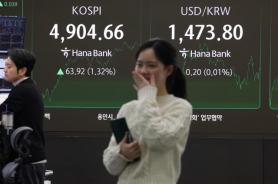![Rahul Anand, IMF South Korea mission chief, briefs on the 2025 annual consultation results at the Government Complex Seoul on Sept. 24. [Photo=Yonhap]](https://image.ajunews.com/content/image/2025/09/24/20250924103436247620.jpg)
SEOUL, September 24 (AJP) - The International Monetary Fund raised South Korea’s economic growth outlook for this year to 0.9 percent, up slightly from the 0.8 percent it projected in July.
But the fund cautioned that the country must push ahead with structural reforms and long-term fiscal consolidation if it wants to strengthen its growth potential.
The revised forecast came after the IMF's annual consultation with Seoul, conducted from Sept. 11 to 24. The fund left its projection for next year unchanged at 1.8 percent, according to South Korea’s Ministry of Economy and Finance.
Inflation, which fell to 1.7 percent in August, is expected to climb back toward the central bank’s 2 percent target in 2025 and 2026. Still, the IMF warned of “high uncertainty and greater downside risks” facing the economy.
“Domestic demand is gradually recovering due to eased fiscal and monetary policies, and strong semiconductor demand is offsetting declines in other exports, leading to a 0.9 percent growth this year,” Rahul Anand, the IMF's mission chief for South Korea, said in a policy briefing. “Next year, GDP is expected to grow by 1.8 percent due to reduced uncertainty, policy effects and base effects.”
Anand also pointed to financial stability concerns, noting that recent measures to curb loan growth in parts of Seoul and to address troubled real estate project financing had helped reduce vulnerabilities.
While endorsing South Korea’s short-term policy direction, the fund pressed for more ambitious reforms. Anand called on the government to accelerate efforts to narrow productivity gaps between small and large firms, manage risks linked to artificial intelligence while harnessing its benefits, and pursue deeper fiscal reforms.
He highlighted the need for pension changes, stronger revenue measures and improved spending efficiency to deal with long-term fiscal pressures. A more credible medium-term fiscal framework, he added, would provide “fiscal anchors” to ensure sustainability.
The IMF publishes its economic forecasts for member countries each April and October, with interim updates for major economies in January and July.
* This article, published by Aju Business Daily, was translated by AI and edited by AJP.
Copyright ⓒ Aju Press All rights reserved.




